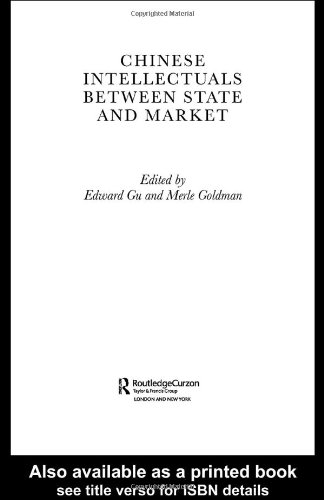

Most ebook files are in PDF format, so you can easily read them using various software such as Foxit Reader or directly on the Google Chrome browser.
Some ebook files are released by publishers in other formats such as .awz, .mobi, .epub, .fb2, etc. You may need to install specific software to read these formats on mobile/PC, such as Calibre.
Please read the tutorial at this link. https://ebooknice.com/page/post?id=faq
We offer FREE conversion to the popular formats you request; however, this may take some time. Therefore, right after payment, please email us, and we will try to provide the service as quickly as possible.
For some exceptional file formats or broken links (if any), please refrain from opening any disputes. Instead, email us first, and we will try to assist within a maximum of 6 hours.
EbookNice Team

Status:
Available4.7
18 reviews
ISBN 10: 0203422112
ISBN 13: 9780203422113
Author: Merle Goldman
This edited volume describes the intellectual world that developed in China in the last decade of the twentieth century. How, as China's economy changed from a centrally planned to a market one, and as China opened up to the outside world and was influenced by the outside world, Chinese intellectual activity became more wide-ranging, more independent, more professionalized and more commercially oriented than ever before. The future impact of this activity on Chinese civil society is discussed in the last chapter.
Part I The Transformation of the Intellectual Public Sphere
1 SOCIAL CAPITAL, INSTITUTIONAL CHANGE AND THE DEVELOPMENT OF NON-GOVERNMENTAL INTELLECTUAL ORGANIZATIONS IN CHINA
Introduction
Pursuing symbolic power in the intellectual field
Capital conversion and structural transformation of the intellectual public sphere
From informal social organization to institutionalization of the social space
The structural transformation of the social space
The forging of an authoritarian state corporatist regulatory system
The autonomy of non-governmental organizations from the Party-state
Capital conversion and the intellectual public sphere: two case studies
Orient magazine: a spin-off from the establishment
The Unirule Institute: growing out of the establishment
Conclusions
Notes
Reference
2 UNDERDOGS, LAPDOGS AND WATCHDOGS
Journalists and the social transformations of post-1989 China
Journalists, economic capital and the new relations of symbolic power
Watchdogs on party leashes
Rewards and punishments: a tale of two journalisms
Conclusions
References
3 HAVE WE BEEN NOTICED YET?
The publicity of intellectuality
The market for disagreement and the Kong-Tai presence
A Causus Bellicosity: the Cheung Kong-Reading Awards
Polemical rhetoric and its “messages”
Conclusion
Notes
References
Part II The Changing Relationship Between Intellectuals and the Party-State
4 FROM PATRONAGE TO PROFITS
Contending views among intellectuals
Cultural intellectuals and the demise of state patronage
The role of intellectuals in shaping civil society and promoting pluralism
Notes
References
5 CHINA'S TECHNICAL COMMUNITY
Introduction
China's competing models of scientific development
The commercialization of research and the growth of the “economic” policy culture
Transforming the “bureaucratic” policy culture
The “academic policy culture” and the quest for autonomy
An emerging “civic” policy culture?
Conclusion
Notes
Reference
6 INTELLECTUALS AND THE POLITICS OF PROTEST
Development of the China Democracy Party
Crackdown on the CDP
Continuities with protest actions of the 1980s
New characteristics
Conclusions
Notes
References
Part III Ideological Alternatives in the Intellectual Public Sphere
7 THE FATE OF AN ENLIGHTENMENT
The origins of the New Enlightenment
The appearance of a public intellectual sphere
The homogeneity of the New Enlightenment
Latent critical responses
Disconnection in the 1990s
Rift One: Thought versus scholarship
Rift Two: The humanist spirit versus common concerns
Rift Three: Liberalism versus the New Left
Notes
References
8 HISTORIANS AS PUBLIC INTELLECTUALS IN CONTEMPORARY CHINA
The “sinification of liberalism” in public debate of the 1990s
Deng Tuo and the early 1960s popular historical essays
Xu Jilin and popular historical essays in the 1990s
Conclusions
Notes
Reference
9 THE PARTY-STATE, LIBERALISM AND SOCIAL DEMOCRACY1
The “rebirth of liberalism”
The re-emergence of social democracy
Liberalism, social democracy and the Party-state
Conclusion
Notes
References
Part IV New Era, New Roles
10 CHINESE INTELLECTUALS FACING THE CHALLENGES OF THE NEW CENTURY
The idea of the Chinese intellectual
The challenge of democratization
The idea of intellectuals is incompatible with democracy2
Intellectual legitimation undermines the autonomy of intellectuals
A Chinese model of intellectuals-led democratization?
The challenge of marketization
The challenge of professionalism
The challenge of globalization: overseas Chinese intellectuals
Concluding remarks on critical intellectuals
Notes
chinese intellectual history
chinese textbook controversy
4 chinese philosophy
4 chinese books
3 stereotypes in american born chinese
chinese intellectuals in crisis
Tags: Merle Goldman, Chinese, Intellectuals